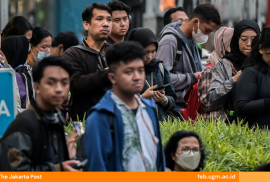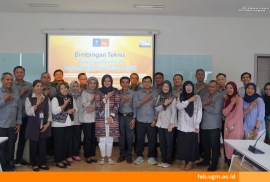In his speech, Eko Suwardi M. Sc., Ph.D., Dean of the Faculty of Economics and Business Universitas Gadjah Mada (FEB UGM) explained the benefits of Public Private Partnerships (3Ps) if it is implemented appropriately in Indonesia. Starting from the building of the more adequate infrastructure to the supporting factor in achieving the goal of fulfilling society’s needs such as health and education. Mr. Eko also mentioned that the recent inauguration of Mass Rapid Transition (MRT) in Jakarta indicated that Indonesia is on a process to be a developed country like the United Kingdom. He said that on Monday (03/25) at the Audio Visual Room Floor 1 FEB UGM during a Public Lecture with the theme: Public Private Partnerships: Trends and Issues. This public lecture was managed through the cooperation between FEB UGM and University of Hull, United Kingdom (UK).
As the speaker of the event, Lynne Barrow, Ph.D., the Associate Dean of International and Engagement, Faculty of Business, Law and Politics, showed a simple model of Public Sector Service Delivery. The principle of 3Ps is used as a macroeconomic tool. When a public and private sector invest, there will be a return to each party. She underlined the shift from direct public service provision to collaborative and contractual service provision in the UK & Internationally over the last 30 years. Throughout the 1980s and 1990s, many OECD governments, most notably the UK Conservative Government, were committed to reduce the size and role of the public sector; believing it to be less efficient than the private sector. Here, the cause of the fundamental shift happened.
In the UK itself, in order to remain effective, public services must respond to society’s changing needs. A recent report by the CBI (2014) estimates that 450,000 new primary places will be needed in England by 2015, the UK population as a whole will rise to over 73 million by 2037 and the number of people over the age of 85 will double by 2035. IFS forecasts total age-related spending to increase by 1.6% of national income, resulting in public spending in total of 44.5% of national income by 2057/2058. Anywise, departmental spending had been cut by more than 18% in real terms between 2010 and 2017.
Next, what is the Private Finance Initiative (PFI)? Most academics use the term 3Ps synonymously with the term PFI, which in its purest form is defined as a ‘design, build, finance, and operate system (DBFO)’. Lynne also added that PFI/3Ps are generally publicly and politically high profile, involve large amounts of funding and are generally used to provide infrastructure assets and services. Since the financial crisis in 2008, most PFIs were financed by a combination of 10-15% risk bearing share capital and 85-90% bank borrowing.
Lynne argued there are various benefits to the public sector regarding the application of the 3Ps. Some of them are value for money because the overall cost to the public service will be reduced, a transfer of risks to the private sector, useful for procuring private sector skills, good for producing ‘optimism bias’ and a reduction in public borrowing. In addition, the perceived advantage can also be seen in the discipline and incentives in market contracting arrangements so that it can inject greater efficiency into infrastructure delivery.
Meanwhile in Indonesia. 3Ps have been introduced since 1998, but the legal concept of 3Ps was introduced in 2005, to boost procurement through a competitive tender process. Moreover, the urgent need to address Indonesia’s critical infrastructure gaps is a key issue often debated during Presidential campaigns. Lynne, as a closing lecture, asked the audience, “If you don’t invest to infrastructure, so how will you compete with other ASEAN countries?”
Source: Santini Dewi Putri




